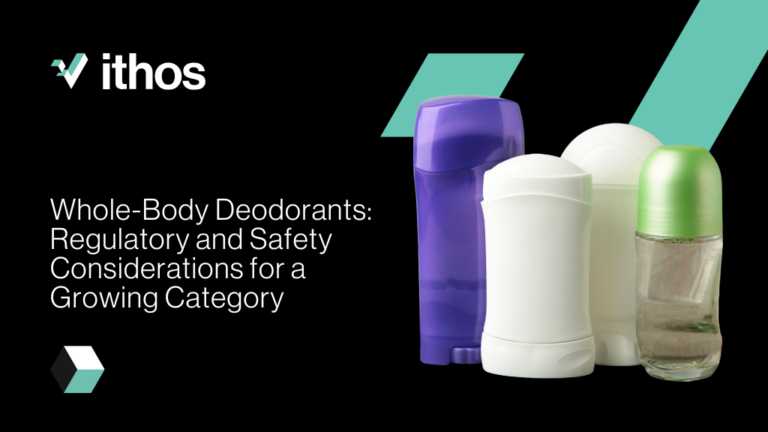
Your brand is your baby, so choosing who makes your products is a major decision, and we compiled five things to consider before contracting a cosmetic manufacturer. Knowing what questions to ask before you sign on the dotted line can prevent production problems and help ensure quality and safety.
At Ithos, we work with companies of all sizes, from independent start-ups to international brands with major buying power. We help draft contracts and provide supplier outreach to help organize documentation. We’ve seen the common challenges facing brands, including fallout from supply chain disruptions caused by Covid. Below are some tips to consider when evaluating your current agreement or considering a new one:
1. Sourcing materials: Make sure your contract requires the manufacturers to inform you if they switch the source of approved raw materials. Ingredients and their compliance have a big impact on the quality of your product and it is too late once the product is already made.
2. Documentation: Require, in writing, a list of the documentation your manufacturer agrees to maintain and the amount of time they can take to provide it. Regulations are constantly changing, especially around packaging and ingredient safety. And you may want to expand to a new market. Don’t lose time and money chasing paperwork – be sure it is always available to you.
3. Non-conformance: Your contract should include a process for dealing with non-conformance. Each time a batch is made, what steps are taken to check specifications? And, if something goes wrong, what happens next? How quickly will they alert you? What are the ways they will correct the problem? Who bears the costs? There should be a checklist used before your product is produced and then released to go to market.
4. Global ingredient policy: In addition to global compliance factors, beauty brands now face increasing scrutiny around ethical and sustainable practices from testing to production. It is vital that your manufacturer understands – and your contract reflects – your formulation and ingredient policy, including the use of animal ingredients and ethical sourcing.
5. Quality standards: Your manufacturer should be able to explain the quality control systems they have in place and include them in your contract. From hygiene to safety protocols, OSHA regulations to contamination shutdown procedures, you should feel confident your manufacturer is meeting quality standards when making your product.
Five tips for finding the best cosmetic contract manufacturer
Four more steps before you sign
In addition to the areas noted above, there are four more steps you should take before signing a contract with your manufacturer:
1. Protect your own agility: Know what your manufacturer can handle and make sure you have thoroughly vetted your capacity constraints and options so that you can remain agile and keep production on schedule.
2. Have a back-up plan: Too often, a brand will start out with one manufacturer, then outgrow capacity or discover issues with quality. It isn’t enough to be able to exit your existing contract, you should also have a plan for where you can move or know what other manufacturers can meet your needs.
3. Get good feedback: Don’t just rely on your regulatory team to review a contract. It covers so many areas, it is important for sourcing, operations as well as your legal counsel to make sure nothing is overlooked. At Ithos, we often serve as fresh eyes, reviewing contracts for our customers.
4. Create a scorecard: Brands who use multiple manufacturers or are considering contract renewal often utilize scorecards to evaluate performance over time. From documentation to responsiveness and on-time delivery, it allows you to address issues or can help decide when it’s time to end a relationship.
Before you pull the trigger
Because we work with both brands and manufacturers, our Ithos team of regulatory experts can provide valuable perspective and experience in solving contract issues. We help draft contracts for brands and also work with contract manufacturers to get documentation and reporting in place. In addition, our supplier outreach solution gathers your documentation, reviews it for completeness and quality, then organizes it for your easy access in the Ithos Information Network. Contact us before pulling the trigger with a new contract manufacturer.







